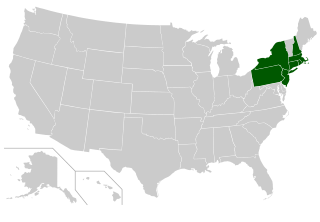
The Ivy League is an American collegiate athletic conference of eight private research universities in the Northeastern United States. It participates in the National Collegiate Athletic Association (NCAA) Division I, and in football, in the Football Championship Subdivision (FCS). The term Ivy League is used more broadly to refer to the eight schools that belong to the league, which are globally renowned as elite colleges associated with academic excellence, highly selective admissions, and social elitism. The term was used as early as 1933, and it became official in 1954 following the formation of the Ivy League athletic conference. At times, they have also been referred to as the "Ancient Eight".

Princeton University is a private Ivy League research university in Princeton, New Jersey, United States. Founded in 1746 in Elizabeth as the College of New Jersey, Princeton is the fourth-oldest institution of higher education in the United States and one of the nine colonial colleges chartered before the American Revolution. The institution moved to Newark in 1747 and then to its Mercer County campus in Princeton nine years later. It officially became a university in 1896 and was subsequently renamed Princeton University.

The University of Pennsylvania is a private Ivy League research university in Philadelphia, Pennsylvania, United States. It is one of nine colonial colleges and was chartered prior to the U.S. Declaration of Independence when Benjamin Franklin, the university's founder and first president, advocated for an educational institution that trained leaders in academia, commerce, and public service. Penn identifies as the fourth-oldest institution of higher education in the United States, though this representation is challenged by Princeton and Columbia since the College of Philadelphia was not chartered or commence classes until 1755 and the first board of trustees was not convened until 1749, arguably making it the sixth or fifth-oldest.

The Harvard Crimson is the student newspaper at Harvard University, an Ivy League university in Cambridge, Massachusetts. The newspaper was founded in 1873, and is run entirely by Harvard College undergraduate students.

The American Whig–Cliosophic Society, sometimes abbreviated as Whig-Clio, is a political, literary, and debating society at Princeton University and the oldest debate union in the United States. Its precursors, the American Whig Society and the Cliosophic Society, were founded at Princeton in 1769 and 1765.

The Princeton Quadrangle Club, often abbreviated to "Quad", is one of the eleven eating clubs at Princeton University that remain open. Located at 33 Prospect Avenue, the club is currently "sign-in," meaning it permits any second semester sophomore, junior or senior to join. The club's tradition of openness is demonstrated as far back as 1970, when Quadrangle became one of the first coeducational eating clubs.
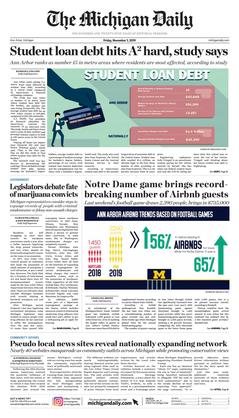
The Michigan Daily, also known as "The Daily," is the independent student newspaper of the University of Michigan published in Ann Arbor, Michigan. Established on September 29, 1890, the newspaper is financially and editorially independent from the university.

Princeton Tower Club is one of the eleven eating clubs at Princeton University in Princeton, New Jersey, United States, and one of six clubs to choose its members through a selective process called bicker. Tower is located at 13 Prospect Avenue between the university-run Campus Club and the Cannon Club. It currently has a membership of approximately 220.

The Lantern is an independent daily newspaper in Columbus, Ohio, published by students at Ohio State University. It is one of the largest campus newspapers in the United States, reaching a circulation of 15,000.

The Daily Princetonian, originally known as The Princetonian and nicknamed the 'Prince', is the independent daily student newspaper of Princeton University. The newspaper is owned by The Daily Princetonian Publishing Co. and boasts a circulation of 2,000 in print and around 30,000 daily online hits as of 2021. Managed by approximately 200 undergraduate students, the newspaper covers a range of sections, including news, sports, and opinions.

The Daily Orange, commonly referred to as The D.O., is an independent student newspaper published in Syracuse, New York. It is free and published once a week during the Syracuse University academic year.

Princeton Terrace Club is one of eleven current eating clubs at Princeton University in Princeton, New Jersey, United States. Terrace Club was founded in 1904 and is located at 62 Washington Road. It is the sole Princeton eating club located off Prospect Avenue.

Nassau Weekly is a weekly student newspaper of Princeton University. Published every Sunday, the paper contains a blend of campus, local, and national news; reviews of films and bands; original art, fiction and poetry; and other college-oriented material, notably including "Verbatim," a weekly overheard-on-campus column.
The State News is the student newspaper of Michigan State University in East Lansing, Michigan. It is supported by a combination of advertising revenue and a $7.50 refundable tax that students pay at each semester's matriculation. Though The State News is supported by a student tax, the faculty and administration do not interfere in the paper's content. The State News is governed by a Board of Directors, which comprises journalism professionals, faculty and students. In 2010, the Princeton Review ranked The State News as the #8 best college newspaper in the country. And in 2015, the Society of Professional Journalists named TSN as the nation's best daily college newspaper for 2014.
The Craig Newmark Graduate School of Journalism at the City University of New York is a public graduate journalism school located in New York City, New York, United States. One of the 25 institutions comprising the City University of New York, or CUNY, the school opened in 2006. It is the only public graduate school of journalism in the northeastern United States.
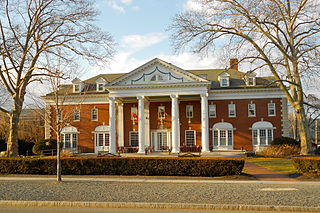
Princeton University eating clubs are private institutions resembling both dining halls and social houses, where the majority of Princeton undergraduate upperclassmen eat their meals. Each eating club occupies a large mansion on Prospect Avenue, one of the main roads that runs through the Princeton campus, with the exception of Terrace Club which is just around the corner on Washington Road. This area is known to students colloquially as "The Street". Princeton's eating clubs are the primary setting in F. Scott Fitzgerald's 1920 debut novel, This Side of Paradise, and the clubs appeared prominently in the 2004 novel The Rule of Four.

The Princeton Tory is a magazine of conservative political thought written and published by Princeton University students. Founded in 1984 by Yoram Hazony, the magazine has played a role in various controversies, including a national debate about white privilege. Notable alumni associated with the magazine include United States Senator Ted Cruz and Wendy Kopp, the founder of Teach for America. Four editors have gone on to be Rhodes scholars.
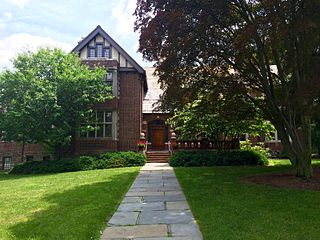
The James Madison Program in American Ideals and Institutions, often called simply the James Madison Program or the Madison Program, is a scholarly institute within the Department of Politics at Princeton University espousing a dedication "to exploring enduring questions of American constitutional law and Western political thought." The Madison Program was founded in 2000 and is directed by Robert P. George, the McCormick Professor of Jurisprudence at Princeton University.
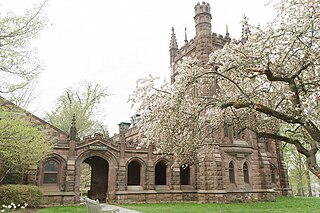
The Princeton Christian Fellowship (PCF), formerly the Princeton Evangelical Fellowship (PEF), is a nondenominational Christian ministry at Princeton University whose purpose is "to help undergraduate and graduate students ... grow as believers and followers of Jesus Christ ... [and] to let the rest of the University community know the full message of Christianity so that others can come to believe and have faith in Jesus Christ." Founded in 1931 by Dr. Donald B. Fullerton, a member of the Princeton University Class of 1913, the PCF is one of the oldest campus ministries of its type, predating the founding of Cru and Intervarsity by a decade or more. PCF is one of the largest student organizations at Princeton University, and is currently led by the Rev. Chris Sallade, a member of the Princeton Class of 1994.
Joshua Timothy Katz is an American linguist and classicist who was the Cotsen Professor in the Humanities at Princeton University until May 2022. He is a scholar on the languages, literatures, and cultures of ancient and medieval history. Currently, he is a senior fellow at the American Enterprise Institute.
















